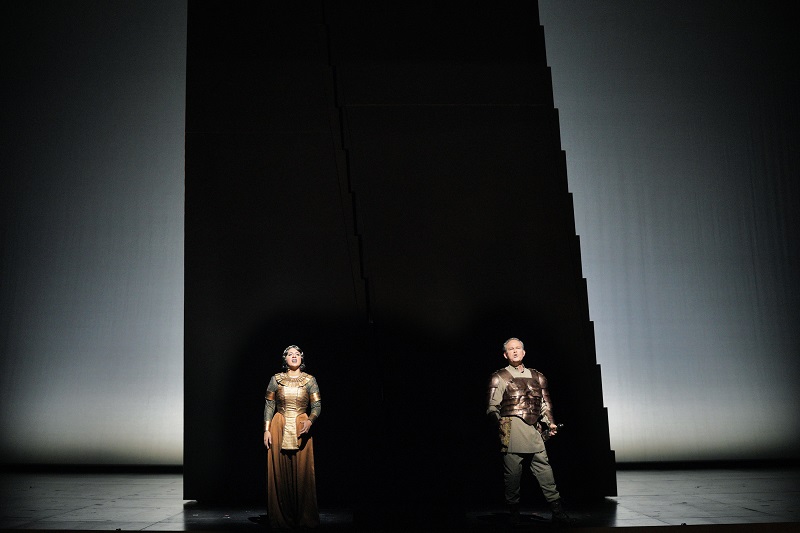
SHAKESPEARE: BRUSH UP YOUR LIBRETTO!
One of the real problems in John Adams’ new opera is that Shakespeare wrote plays but never opera librettos.
Now, Will, “Hamlet,” “Macbeth” and “Othello” are all well and good as stage plays, but couldn’t you think of baritones and sopranos too?
In using Shakespeare and earlier texts for almost all of his libretto, composer Adams was stuck with lines rarely ending in vowels. He thus saddles the singers with drooping fade-out lines that suppress their attractiveness and expressiveness. Just try singing and projecting lines like “I have offended reputation, a most unnoble” (etc.)—killer consonants galore.
If the music of the new Adams “Antony and Cleopatra” focused on harsh conflict in the first half with jolting outbursts, the second half works much better. There much-needed dulcet orchestral sounds plus several deft intermezzos offset the brass and percussion dominating act one.
The second half shows off the versatility and vast talent of composer Adams, who has himself attended and reviewed each of the two performances to date at the S.F. Opera House. Therein he produces essential soliloquies for even supporting singers, letting them pour out both souls and history.
The patrons will bemoan the shortage of vocal ensembles—it’s solo singing, apart from a short duet as Antony is dying, a love scene under a starry sky which will be remembered as the most endearing moment of the whole night. But to end up with not one but two death scenes, each a good 10 minutes long, makes for an uncomfortably drawn-out finale sapping the impact of the opera.
Some of the orchestral segments are ethereal, starting with music reminiscent of the opening of “The Ring of the Nibelung,” as if to foreshadow the disasters in store. Once again, as Cleopatra is about to die, the orchestra with its harp and chimes provides sounds sweet and tender underlying her final soliloquies before the asp’s bite takes over.
Much credit goes to Music Director Eun Sun Kim, conducting in the pit persuasively while constantly cuing the tricky vocal lines for singers.
But the essence was the strong trio of lead singers, with baritone Gerald Finley and new soprano Amina Edris in the title roles, plus tenor Paul Appleby as Caesar (Augustus), on the strong but raspy side as befits an emerging emperor-dictator. Edris, herself more Egyptian than the Greek queen of Egypt Cleopatra, saved the show stepping in after a cancellation with her unwavering lyric soprano and a poise to match. She establishes Cleopatra as the unmistakable focal figure retaining her composure after the fall of Antony. Antony’s stubborn military misjudgments lead to unmitigated disaster. That leaves Cleopatra, as the night’s Isolde, to conclude the drama with a high note or three.
To underline the emerging fascism, vintage films from around 1930 drew more modern parallels in a highly imaginative production (under Director Elkhanah Pulitzer) of sliding panels, “snapshot” scenelets, and even a grand moment up in the clouds for the unrealistic Antony and his lieutenant.
Despite the rousing chorus, the act one finale of the disastrous sea battle at Actium was incomprehensible, looking more like a campus protest demonstration.
This is a significant new stage work to mark the S.F. Opera’s centennial. If the flaws here are notable, the assets are evident enough to warrant a revision and reprise for future seasons.
At the conclusion Sept. 15, the audience response was polite but restrained. Some of the artists during the bows came forward to congratulate prompter Matthew Piatt in his box, for his helping them negotiate a demanding contemporary score.
Our review supplements here the initial reactions voiced in the Sept. 10 opening-night view of “A and C,” as some call it.
WORLD-PREMIERE OPERA by John Adams, “Antony and Cleopatra,” opening the S.F. Opera’s 100th year. In English, with supertitles; nine scenes, two acts, one intermission, three and a quarter hours. Opera House, San Francisco, repeating to Oct. 5. For info: (415) 864-3330, or go online: www.sfopera.com.